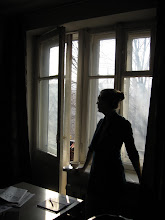 Yesterday was kind of an adventure - I went to see a "master" maker of kyl-kobyz, Tolegen-agha*, who was referred to me by an instructor at the Conservatory as "the best." Many of the most accomplished kobyz performers in Kazakshtan use his instruments, including my teacher Raushan and my friend Akerke.
Yesterday was kind of an adventure - I went to see a "master" maker of kyl-kobyz, Tolegen-agha*, who was referred to me by an instructor at the Conservatory as "the best." Many of the most accomplished kobyz performers in Kazakshtan use his instruments, including my teacher Raushan and my friend Akerke.However, finding this guy was a bit of a challenge - he lives in a little collection of houses located in the mountains right outside Almaty. The place is called "Sheber Aul" (Village of Masters), because when it was founded it used to be home to many different artists and craftspeople. Now it's kind of fallen into disarray, although some people still continue their work. I took a bus to a distant micro-region of Almaty, and then was instructed to catch another bus to Sheber Aul. But after waiting and looking around for this bus for about half an hour and asking several people who had never heard of Sheber Aul, I was about to give up. I called Tolegen-agha and told him that maybe I could try again the next day, but he said "No, no, I'll pick you up!" He drove down the mountain, met me at the bus stop, and we headed to Sheber Aul.
We sat and talked in his apartment for over an hour - his mother was there too, pouring tea for us and occasionally adding comments to Tolegen's answers to my questions. Unfortunately, he didn't want me to record him talking, and he wouldn't allow any pictures taken of him - so I just took a few photos of his work. He didn't have any finished instruments on hand, but he showed me five kobyz-in-progress that he had finished carving, made of either pine (lighter color) or elm (darker, and apparently the best wood for this purpose).
 They have to dry for several months, during which time, he said, some of them develop cracks -- these would end up as "souvenirs," he said, but couldn't be professional instruments due to the flaw in the wood. Of course, the souvenirs bring in significantly less income than the professional instruments. Out of the five he showed me, only two of them were in good enough shape to become "professional" -- imagine putting in all that work, only to find after out much later that all your effort will only bring in a fraction of what you were hoping for! (Come to think of it, actually, I guess the same could be said for grad school. Hmm....)
They have to dry for several months, during which time, he said, some of them develop cracks -- these would end up as "souvenirs," he said, but couldn't be professional instruments due to the flaw in the wood. Of course, the souvenirs bring in significantly less income than the professional instruments. Out of the five he showed me, only two of them were in good enough shape to become "professional" -- imagine putting in all that work, only to find after out much later that all your effort will only bring in a fraction of what you were hoping for! (Come to think of it, actually, I guess the same could be said for grad school. Hmm....)Tolegen-agha is very into the spiritual aspects of kobyz making. He said that soon after he starting trying to make instruments, he had a dream in which his ancestors showed him how to do it properly, and he complained about modern man's separation from nature. In his opinion, the kobyz the the most "ecological" of Kazakh instruments because it's the only one that's still made out of all natural materials - a hollowed-out block of wood, horse hair, leather, and sometimes metal pieces for decoration. He also complained about lack of government support for artists such as himself, which is really too bad because even though everyone seems to agree that he's extremely talented, he only sells an average of five instruments per year (they are apparently at the top of the price range for kyl-kobyz due to their high quality), which doesn't amount to much more than a living wage.
After our long chat, Tolegen-agha kindly drove me to the bus stop at Sheber Aul (the bus I wasn't able to find earlier was fortunately waiting at the entrance to the village). On the bus ride down the mountain, I saw lots of cherry trees in full bloom and a beautiful mist over the hilltops where the snow still hasn't melted. Hard to believe that a place like this sits just a fifteen minute drive outside the smoggy, car-choked streets of central Almaty...!
* agha - means "uncle" or "older brother" but is used among Kazakh-speakers to show respect


3 comments:
What a great adventure. Did Tolgen-agha say anything about the wood having to 'cure' before carving? I heard in a Roksonaki interview that it takes 50 years for a piece of wood to be ready to become a kobyz -- sounds kind of far-fetched. What have you learned?
Excellent posting! Thnak you.
I loved this post and this blog.
Have a nice day.
hey, looks like you're getting some interesting folks reading your blog! awesome! Even from Portugal!
I love yur narration in this post.
beijos
Post a Comment